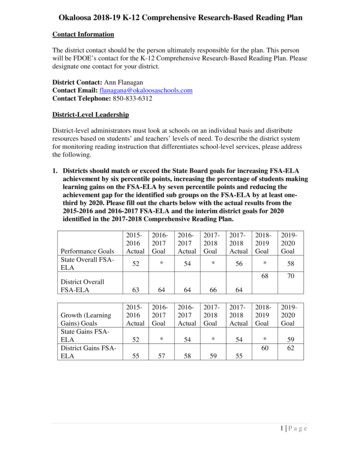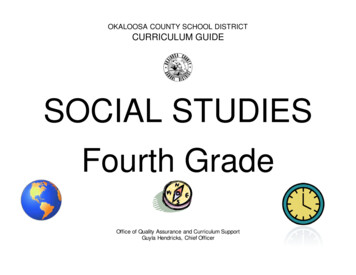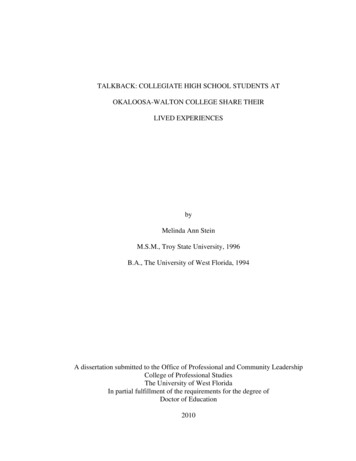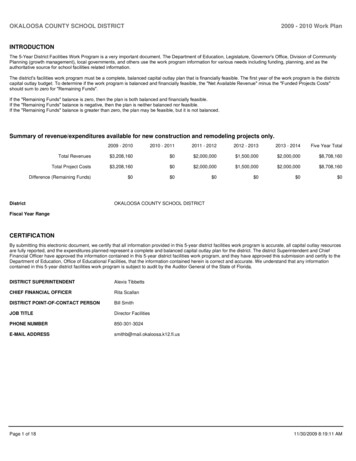
Transcription
Okaloosa 2018-19 K-12 Comprehensive Research-Based Reading PlanContact InformationThe district contact should be the person ultimately responsible for the plan. This personwill be FDOE’s contact for the K-12 Comprehensive Research-Based Reading Plan. Pleasedesignate one contact for your district.District Contact: Ann FlanaganContact Email: flanagana@okaloosaschools.comContact Telephone: 850-833-6312District-Level LeadershipDistrict-level administrators must look at schools on an individual basis and distributeresources based on students’ and teachers’ levels of need. To describe the district systemfor monitoring reading instruction that differentiates school-level services, please addressthe following.1. Districts should match or exceed the State Board goals for increasing FSA-ELAachievement by six percentile points, increasing the percentage of students makinglearning gains on the FSA-ELA by seven percentile points and reducing theachievement gap for the identified sub groups on the FSA-ELA by at least onethird by 2020. Please fill out the charts below with the actual results from the2015-2016 and 2016-2017 FSA-ELA and the interim district goals for 2020identified in the 2017-2018 Comprehensive Reading Plan.Performance GoalsState Overall FSAELADistrict OverallFSA-ELAGrowth (LearningGains) GoalsState Gains FSAELADistrict Gains 0192020Goal52*54*54*60596255575859551 Page
State AchievementGaps on ents withDisabilities/Studentswithout DisabilitiesEnglish LanguageLearners/ NonEnglish 30*32*31*20District2015- 2016- 2016- 2017- 2017- 2018- 2019Achievement Gaps2016201720172018201820192020on FSA-ELAActual GoalActual GoalActual /NonEconomicallyDisadvantaged2422242021Students with2825Disabilities/Studentswithout Disabilities3933413141English Language2220Learners/ NonEnglish LanguageLearners3228382536* Values for subsequent years will be entered once results are available in order to trackprogress toward the 2020 goal.2. Explain how expenditures from the allocation are expected to impact studentachievement in relation to your district goals.Okaloosa County School District is committed to professional development as a meansto improve student performance. Based on data from FSA and teacher feedback,professional development on text-based writing, teaching literature, and Kahn Academytraining will be provided this summer. Funds are also allocated to provide professionaldevelopment for the creation of Standards-based Everyday Instructional Readsincorporating purposefully sequenced TDQs leading to a rigorous culminating task.Funds for Writing Working Groups for pacing and creation of integrated reading andwriting tasks are also included.2 Page
A consultant from the National Archives to work with Social Studies teachers to helpthem increase their knowledge of how to access resources and utilize information tocreate standards-based, differentiated lessons is paid for through the ReadingAllocation. Emphasis will be placed on how to create purposeful TDQs and usedocuments in cooperative learning groups.The use of data to drive instruction as a means to improve student achievement is also apriority for our school district. Okaloosa County uses Measures of Academic Progress(MAP), purchased from the Reading Allocation, as one instrument to monitor studentsprogress and help differentiate instructions. Training for administrators to help progressmonitor and for teacher leaders to train at the school site is included in the plan. Fundsfor release days for Intensive Reading teachers for instruction on use of data from bothAchieve 3000 and MAP will be provided to help them fully understand how to progressmonitor and differentiate instruction within the Balanced Literacy Model.All of the elementary and middle schools have access to a Reading Coach on a regularbasis. Funds for 11.3 coaches are included in the K-12 Reading Allocation. Additionalcoaches are provided through other sources of funding. Embedded professionaldevelopment in the form of modeling, planning, and co-teaching within a coachingcycle will improve teacher effectiveness and subsequently student performance.Coaches also facilitate data chats to help teachers triangulate data and plan instruction.Funds for student resources, such as Achieve 3000 for IR students, i-Ready andAccelerated Reader for elementary students, and summer reading camp materials arealso included to target students in need of intervention.3. In regard to district-level monitoring of student achievement progress, pleaseaddress the following:A. Who at the district level is responsible for collecting and reviewing studentprogress monitoring data?The Assistant Superintendent for Instruction, Marcus Chambers, and theCurriculum Directors, Sheila Lightbourne and Jeff Palmer, as well as CurriculumSpecialists, Denise Reichal and Melissa Bowell, are responsible for reviewingstudent progress monitoring data. The Reading Curriculum Specialist, AnnFlanagan, the Math Curriculum Specialist, Stephanie Thetford, the ScienceCurriculum Specialist, Tami Ellis, and the Title I Specialist, Amy Dale, the ESEProgram Director, Melody Sommer, also collect and review data for their programs.Lisa Tucker, Teacher on Special Assignment for ELL, monitors performance forthat population.3 Page
B. What specific school-level progress monitoring data will be collected at thedistrict level to determine that students are progressing toward the districtgoals stated above? Please specify which grade levels are associated withspecific school-level progress monitoring tools discussed in this section.Okaloosa uses the Measures of Academic Progress (MAP) for progress monitoringin grades K-10, along with students in grades 11 and 12 who are still in need ofremediation. Okaloosa County has also implemented instructional technologywhich provides reports related to progress monitoring and instructional needs forstudents in need of remediation. These include i-Ready for elementary and Achieve3000 for secondary. Information regarding usage and progress are monitored by theCurriculum Specialists.C. How often will student progress monitoring data be collected and reviewed bythe district?Okaloosa County progress monitors two to three times a year through Measures ofAcademic Progress depending on the grade level and needs of the students. Data iscollected and reviewed by the district after each administration. School Review SiteVisits are scheduled with each school by the Curriculum and Instruction Team todiscuss data and ascertain school-wide progress. Plans for increasing progresstowards district goals are discussed during the review.Monitoring and review of the i-Ready and Achieve 3000 is conducted monthly4. Who at the district level is responsible for ensuring the fidelity of students notprogressing towards district goals receiving appropriate interventions?Intervention guidelines for students in Okaloosa School District not progressingtowards district goals are outlined in our Pupil Progression Plan. The plan is developedthrough a committee consisting of teachers and administrators and approved by theBoard of Education. Okaloosa has developed and implemented a Multi-Tiered Systemof Supports to ensure that struggling students receive appropriate assistance necessaryto be successful in meeting pupil progressing requirements. The MTSS process guidesour monitoring and remediation with students who are not progressing towards goalsbased on data.5. In regard to district-level monitoring of instructional alignment to grade-levelFlorida Standards, please address the following:A. Who at the district-level is responsible for ensuring classroom instruction isaligned to grade-level Florida Standards?The Department of Curriculum and Instruction is responsible for ensuringclassroom instruction is aligned to grade-level Florida Standards. Teachers havebeen trained in the use of Item Specs and ALDs during Central MessageProfessional Development. This will continue to be a focus for the 2018-19 schoolyear. Learning progressions have been developed for grade Kindergarten throughgrade 2.4 Page
The Department of Curriculum and Instruction has also developed StandardsResource Books that contain Item Specs, ALDs/Learning Progressions, questionstems of varying DOK levels for teachers in planning and administrators duringwalkthroughs and formal evaluations. Specific instructional strategies by standardare also included.B. What evidence will be collected to demonstrate that classroom instruction isaligned to grade-level Florida Standards?Okaloosa County has a compressive system of reviewing school implementation ofSPP Initiatives and classroom instruction. Building administrators meet for SchoolSite Reviews with a Central Office Administration Team at the school site tomonitor student achievement and implementation of instructional methodologiesthat align with the Florida Standards. During these visits, the CentralAdministration Team also visits classrooms to gather evidence of implementation inaction. Schedules and minutes of School Reviews are kept at the district level.C. How often will this evidence be collected at the district level?Each school has one formal School Review Site Visit and one formal data chatduring the year. Multiple informal reviews are also conducted. The intensity ofthose visits will vary from school to school depending upon need.6. In regard to access to informational text for each content area in a variety ofmediums, please address the following:A. Who at the district level will be responsible for ensuring that schools haveaccess to informational text for each content areas in a variety of mediums?The Curriculum and Instruction Department is responsible to ensure that schoolshave access to informational text for each content area in a variety of mediums.During our Central Message Professional Development, which is developed by thecontent specialists at the district level, teachers are exposed to websites and othermaterials they can access for informational text. Standards-based lessons are alsodeveloped.B. In addition to using texts from core, supplemental and intervention programs,what will the district do to ensure that schools have access to informational textfor each content area in a variety of mediums?Okaloosa County is demonstrating its commitment to the use of informational textfor each content area by training teachers through our Common ProfessionalDevelopment on how to locate complex text online through public domain andprivately held websites which have been purchased by the Reading Specialist, TitleI, and the Professional Development Specialist. One of the foci of this professionaldevelopment is emphasizing complex text while using multiple resources (CommonLit, NewELA, Achieve 3000, Read Works, Achieve 3000, Time for Kids, StoryWorks, Flocabulary, FJCC, and National Archives). These, and other resources, arebeing added to our curriculum guides. The instructional coaches have providedadditional training to their teachers on how to access these websites to locateinformational text.5 Page
In addition, the district provides training for US History teachers with a consultantfrom the National Archives on how to access materials contained on their website.Civics teachers are trained in the use of informational text through FJCC. Mostsecondary Social Studies teachers have been trained with the DBQ project and thedistrict has provided those materials to the schools. Intensive Reading teachers useAchieve 3000 as a major form of instruction. All Okaloosa teachers have a genericpassword to Achieve 3000 as a means of securing informational text at variousLexile levels.7. In regard to Universal Design for Learning (UDL), please address the following:A. Who at the district level will ensure that the all classroom instruction isaccessible to the full range of learners using UDL principles?The Department of Curriculum and Instruction is responsible for ensuringclassroom instruction is accessible to the full range of learners using UDL. TheAssistant Superintendent for Instruction, Marcus Chambers, and the CurriculumDirectors, Sheila Lightbourne and Jeff Palmer, are supported by the CurriculumSpecialists: Ann Flanagan, Denise Reichal, Melissa Bowell, Amy Dale, DeniseMcLaughlin, and Tami Ellis. Instructional Coaches have all participated in atraining on UDL provided by FDLRS. This will help guide their work withteachers. Intensive Reading teachers will participate in UDL training during the2018-19 school year. Additionally, all Okaloosa teachers have access to coursesprovided by FDLRS.B. What evidence will the district collect to demonstrate that all classroominstruction is accessible to the full range of learners using UDL principles foreffective instructional design (planning) and delivery (teaching)?Okaloosa County has a comprehensive system of reviewing school implementationof SPP Initiatives and classroom instruction. Building administrators meet forschool reviews with a Central Office Administration Team at the school site tomonitor student achievement and implementation of instructional methodologiesthat align with the Florida Standards. During these visits, the CentralAdministration Team also visits classrooms to gather evidence of implementation inaction. Schedules and minutes of School Reviews are kept at the district level.C. How often will this evidence be collected at the district level?Each school has one formal School Review Site Visit during the year. Multipleinformal reviews are also conducted. The intensity of those visits will vary fromschool to school depending upon need.6 Page
8. As a separate attachment please provide the meeting agenda which demonstratesthe district contact for the K-12 Comprehensive Research-Based Reading Plan hasmet with the district contact for Exceptional Student Education (ESE) to discussthe alignment between the District's Special Programs and Procedures (SP&P)requirements and the district's 2018-2019 K-12 Comprehensive Research-BasedReading Plan, as well as documentation that the district contact for the K-12Comprehensive Research-Based Reading Plan has met with the district ELLcontact to discuss alignment with their district ELL plan.See Appendix A.Research-Based Reading Instruction AllocationAs per Section 1011.62(c), F.S., funds allocated under this subsection must be used toprovide a system of comprehensive reading instruction to students enrolled in the K-12programs, which may include the following: An additional hour per day of intensive reading instruction to students in the 300lowest-performing elementary schools by teachers and reading specialists who areeffective in teaching reading; Kindergarten through grade 5 reading intervention teachers to provide intensiveintervention during the school day and in the required extra hour for studentsidentified as having a reading deficiency; Highly qualified reading coaches to specifically support teachers in makinginstructional decisions based on student data and improve teacher delivery ofeffective reading instruction, intervention and reading in the content areas based onstudent need; Professional development for school district teachers in evidence-based readinginstruction, including strategies to teach reading in content areas with an emphasison technical and informational t
Okaloosa uses the Measures of Academic Progress (MAP) for progress monitoring in grades K-10, along with students in grades 11 and 12 who are still in need of remediation. Okaloosa County has also implemented instructional technology which provides reports related to progress monitoring and instructional needs for students in need of remediation.










